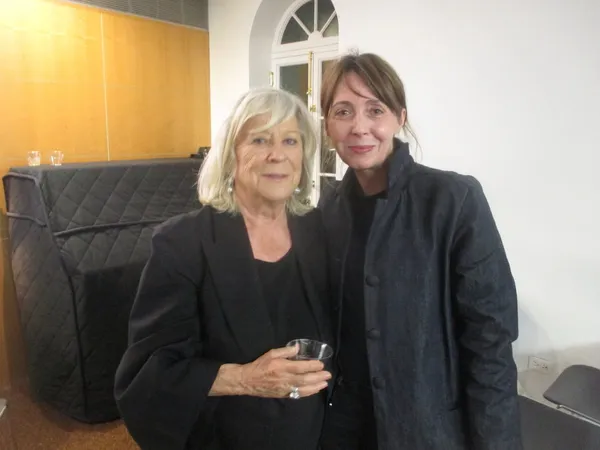 |
| Margarethe von Trotta with Anne-Katrin Titze, on Ingmar Bergman: "He wanted to be the child all the time. Even when he was grown up." Photo: Gary Springer |
On Columbus Day, following An Afternoon with Barry Jenkins (director of Oscar-winning Moonlight and the adaptation of James Baldwin’s If Beale Street Could Talk), a discussion led by Darryl Pinckney at Alice Tully Hall during the 56th New York Film Festival, Margarethe von Trotta joined me for a conversation on Searching For Ingmar Bergman.
In the Elinor Bunin Munroe Film Center green room, we discussed the interviews she conducted with Stig Björkman, Mia Hansen-Løve, Ruben Östlund, Olivier Assayas, Jean-Claude Carrière, Daniel Bergman, and Gaby Dohm. She also shared her thoughts on The Seventh Seal, Winter Light, Fanny and Alexander, The Serpent's Egg, From the Life of the Marionettes, the persona of Ingmar Bergman, a Rainer Werner Fassbinder connection, ETA Hoffmann, and the hour of the wolf.
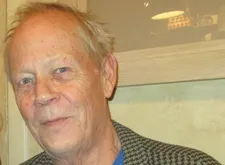 |
| Margarethe von Trotta to filmmaker and author of Bergman on Bergman, Stig Björkman: "You know, you are really a very good actor." Photo: Anne-Katrin Titze |
On this past Tuesday at Deutsches Haus, NYU, Margarethe von Trotta was honoured with the inaugural Ulfers Foundation Award for her remarkable career and Searching For Ingmar Bergman was shown in the Retrospective programme of the New York Film Festival.
Anne-Katrin Titze: Last time we spoke was on the steps of the New York Public Library and Volker Schlöndorff was filming us for Return To Montauk. Remember?
Margarethe von Trotta: No. Ah, yes, I thought you meant we did an interview. No, no, we were extras!
AKT: Exactly, we were extras.
MvT: That was fun, no? That was a lot of fun.
AKT: It was. The moment in the film is very brief.
MvT: And I had to tell our group: now we are in, now we go, because nobody of the extras knew, like Pam Katz who was with me. And I looked and said now it's coming. But it's very short, yes. [Margarethe looks at my notebook] Oh, you are still writing! That's fantastic.
AKT: I am - but these aren't actually your notes, these are from the Barry Jenkins talk I just came from. There is a lot of you searching for Bergman - hence the title.
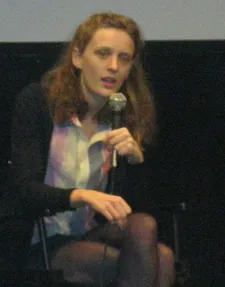 |
| Margarethe von Trotta on Mia Hansen-Løve's comment in the film on Bergman's Fårö house: "If I had been alone in this house it would have been spooky for me, too." Photo: Anne-Katrin Titze |
MvT: The title, you know, you invent the title after you've done the film and then you see what you did. After the montage, the editing, then you search for the title. It seemed to us the right title then.
AKT: You get snippets on Bergman from people who come from totally different angles. Let's start with, quite randomly, Mia Hansen-Løve who said that she felt this presence, a spookiness at his house on Fårö. Did you ever feel that while you were there?
MvT: I was only there for one day. And I had the whole day together with the two brothers [two of Bergman's sons]. The first one, Daniel, who is speaking for a long time in the film, but also the other, little Ingmar. We spent the whole day with them so I was never alone. I think if I had been alone in this house it would have been spooky for me, too. Because you could feel a certain presence. Maybe that's our imagination.
AKT: I came here into this ugly green room and immediately we were both saying - ooh, Bergman! You just conjure things up with him because he did that so much in his films. He got away with more supernatural than other filmmakers.
MvT: That is true. For instance he was also a bad sleeper. He wouldn't sleep during the night very well or he took pills or he woke up at four in the morning. And then he had really bad feelings and bad dreams also. And so he put all that in his films. Like I had them very very strongly - bad dreams, really horrible dreams. I always felt very close to him.
We are both Northern people. The Nordic human beings are more linked to darkness because it is more dark. Mainly in Sweden, it's just the big summer period where it's light, light, light and it even doesn't go away in the night. Otherwise it's very dark.
AKT: And there's what he calls the "hour of the wolf." Not just in the title of his film but it comes up throughout.
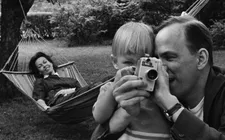 |
| Käbi Laretei and Ingmar Bergman with their son Daniel |
MvT: There he says in that scene, the hour of the wolf it's when people are dying.
AKT: The hour when people die, when they are born and when the nightmares come.
MvT: That was for a long time for me the same. I also woke up in the night and was very panicked. I like this film very much. It's one of my favourites. Also because it's only fantasies. It's nightmares but fantasies. Much more than in other films.
It reminds me a lot of a Romantic writer, German writer, ETA Hoffmann. That was one of my favorite when I was a student and I read that Bergman knew this writer because he spoke German. I found so many things similar to Hoffmann in this film.
AKT: Any specific Hoffmann story you are thinking of? The Sandman? All the doubles!
MvT: The doubles, the Doppelgänger.
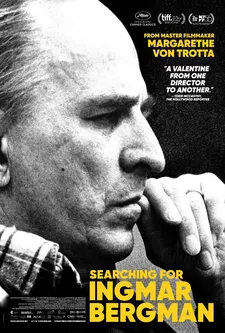 |
| Searching For Ingmar Bergman poster - opens in the US on November 2 |
AKT: And Bergman's mirrors.
MvT: The mirror thing. That you're looking in the mirror and you don't know: is that you? Is that somebody else?
AKT: The clip you have in the documentary with a character looking in the mirror saying: I see this infantile old man.
MvT: Yes, that's From the Life of the Marionettes. That is for me also the proof - my theory was, and I said it to Daniel, his son, and he said "You're totally right." He [Ingmar Bergman] was feeling like a child. He wanted to be the child all the time. Even when he was grown up. He wanted to be this child and therefore he could't care so much about his own children. Because he was the child.
AKT: They were competition.
MvT: That's also when he [the actor in the scene] is looking in the mirror, he says, "I'm closing my eyes, I'm a young boy. And when I open my eyes, I'm an old slob". That is exactly what he was feeling in this period too.
AKT: And, of course, the terrifying idea of not recognizing yourself and being confronted in the mirror with something other. You start the film with scenes from The Seventh Seal and playing chess with Death. You make the point that this film was really your first great cinematic experience and had the effect that you wanted to make films.
And that was a film about an encounter with a personified death. I was thinking how it relates to the idea of cinema, as meeting death. Is cinema playing chess with death?
MvT: Absolutely. When I saw it, I came out of Germany, a religious school, Protestant religion. There we had to pray all the time. I was a little bit annoyed then with religion, I must say, after all these years. But there was still this question, is there a God or not? And does he speak to us? And that was also one of the main themes in the film.
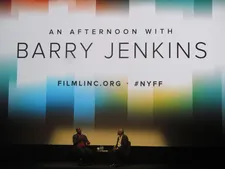 |
| An Afternoon with Barry Jenkins discussion led by Darryl Pinckney at Alice Tully Hall Photo: Anne-Katrin Titze |
AKT: Stig Björkman had mentioned to me in an email before I saw your film, "I am so much in this film!" And it's true he is there on camera explaining a lot.
MvT: He said that to you? Ha, he was with us also in Cannes and presenting the film together with us. He was very nice, very nice, very friendly and helping. But he never was an actor. And I said, "You know, you are really a very good actor." And he said, "I'm so glad, now I can become an actor!"
AKT: It's great. He is also your tour guide through Stockholm and leads you to the church. I imagined for some reason Bergman's father's church not to be this gigantic. And then to read on the plaque that he was the parson there from 1934 to 1955. The entire war years! Did you find out any more about that?
MvT: I didn't so much care about that, but you are right to think about it. The thing was that he [his father] was colleagues with a German pastor in Weimar. And he sent his son, Ingmar Bergman, to this family. And this family was very much linked to Hitler. They adored Hitler. From the pulpit this pastor read out of Mein Kampf, instead of the Bible. They were such followers of Hitler and so Bergman also, he was fond of him because they were fond of him.
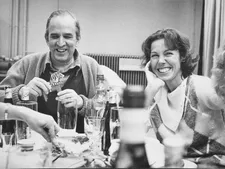 |
| Margarethe von Trotta on Ingmar Bergman with Gaby Dohm of the Residenztheater: "They loved him. He was fantastic with them." |
After the war he was so ashamed of himself that he hadn't been more severe or questioning. But also Swedish people were often followers of Hitler in these times. After the war, sure after it was known what terrible things happened in Germany and with the Jews. Therefore he said, Ingmar Bergman, "I would never do a political film. I don't want to interfere anymore with politics. I made this very big error once in my life."
AKT: And with The Serpent's Egg, you could say …
MvT: That is on the border. But that was before Hitler came to power. He [Hitler] tried this uprising in '23 and in '33 he came to power. We had still ten years left with a sort of democracy.
AKT: The Bergman street is in Geiselgasteig [film studio].
MvT: It was. That was built for him for this film.
AKT: Fassbinder also used it.
MvT: After that Fassbinder and others did films there but it doesn't exist anymore.
AKT: I had a student job as a tour guide there for a while, when parts of the street still existed. Bergman was doing theatre at the Residenztheater and it felt a bit like time travel for me when I recognised the voice of Gaby Dohm. You can see how so many of the actresses still so much admire him.
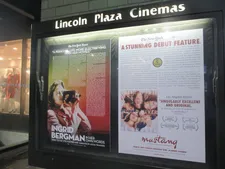 |
| Stig Björkman's Ingrid Bergman: In Her Own Words Photo: Anne-Katrin Titze |
MvT: They loved him. He was fantastic with them.
AKT: Total infatuation.
MvT: Yes. Absolutely. All his actresses were this way. Also actors, not all of them. Like in Sweden, he had a sort of family. He created a sort of family with actors and actresses he liked and they liked him so they could work together in a very familiar and creative way.
AKT: There is the Bergman theatre festival each year in Stockholm, I think in September.
MvT: In Fårö they have every year a remembrance for several days. I was there this year also and showing my film and speaking with people.
Searching for Ingmar Bergman opens in the US on November 2.
Margarethe von Trotta: The Political Is Personal retrospective starts on November 2 at the Quad Cinema in New York.
The 2018 New York Film Festival runs through October 14.





















